#laura spinney
Text
Conclusion:
Yet in his lifetime Shakespeare was responding to a rich and varied literary ecosystem. His contemporaries also recognised other greats – including a poet named Thomas Watson whose lauded plays have almost all been lost (only one survives, his version of Sophocles’ Antigone written in Latin). Who knows how we would judge Shakespeare – whom one contemporary described as “Watson’s heir” – had the full spectrum of English literature from his time, or the eras before and after him, survived. Who might the giants of world literature be, if we knew just what those 30m Indian manuscripts contained, or if the millions of others that were burned or mouldered away had survived. Greatness may sometimes be less a property of great minds than an accident of history.
0 notes
Note
re: the last anon (not me i'm just always hunting for book recs) anything else for medical history? i have the two books you've listed already on my tbr and would b interested in something in the realm of infectious disease/historical pandemics or something along the lines of the immortal life of henrietta lacks/the radium girls/books about phossy jaw where it's also a bit of a human interest piece of this helps at all
youtube
Diseases? I GOT YOU COVERED. I love diseases. I have 2 whole levels of my built-in bookshelf containing nothing but books about diseases. I got malaria, cholera, influenzas, fevers, smallpox, ebola, polio, the black death, etc.
Justinian's Flea: The First Great Plague and the End of the Roman Empire by William Rosen
The Ghost Map: The Story of London’s Most Terrifying Epidemic — and How It Changed Science, Cities, and the Modern World by Steven Johnson
Flu: The Story Of the Great Influenza Pandemic of 1918 and the Search for the Virus That Caused It by Gina Kolata
The Demon Under the Microscope by Thomas Hager
The Great Mortality: An Intimate History of the Black Death, the Most Devastating Plague of All Time by John Kelly
Pale Rider: The Spanish Flu of 1918 and How It Changed the World by Laura Spinney
Polio: An American Story by David M. Oshinsky
The Fever: How Malaria Has Ruled Humankind for 500,000 Years by Sonia Shah
Pox Americana: The Great Smallpox Epidemic of 1775-82 by Elizabeth A. Fenn
The Hot Zone: A Terrifying True Story by Richard Preston
#norman osborne voice i am something of a disease myself#i also have a bunch of these on my gdrive#nedlittle#assbox
29 notes
·
View notes
Text
The big idea: could the greatest works of literature be undiscovered?
Only a fraction of the world’s stories have survived. What might we be missing?

by Laura Spinney
When the great library at Alexandria went up in flames, it is said that the books took six months to burn. We can’t know if this is true. Exactly how the library met its end, and whether it even existed, have been subjects of speculation for more than 2,000 years. For two millennia, we’ve been haunted by the idea that what has been passed down to us might not be representative of the vast corpus of literature and knowledge that humans have created. It’s a fear that has only been confirmed by new methods for estimating the extent of the losses.
The latest attempt was led by scholars Mike Kestemont and Folgert Karsdorp. The Ptolemies who created the library at Alexandria had a suitably pharaonic vision: to bring every book that had ever been written under one roof. Kestemont and Karsdorp had a more modest goal – to estimate the survival rate of manuscripts created in different parts of Europe during the middle ages.
Using a statistical method borrowed from ecology, called “unseen species” modelling, they extrapolated from what has survived to gauge how much hasn’t – working backwards from the distribution of manuscripts we have today in order to estimate what must have existed in the past.
The numbers they published in Science magazine earlier this year don’t make for happy reading, but they corroborate figures arrived at by other methods. The researchers concluded that a humbling 90% of medieval manuscripts preserving chivalric and heroic narratives – those relating to King Arthur, for example, or Sigurd (also known as Siegfried) – have gone. Of the stories themselves, about a third have been lost completely, meaning that no manuscript preserving them remains.
READ MORE
7 notes
·
View notes
Text
so you know how I read 12 books in april and I was really proud of myself for that? in may I read 21 books and I don't really know why, I suspect it was because I was a bit stressed and reading always calms me down. anyway, here are my favourites:
the return of the sun - michael j kral - 4/5
why be happy when you could be normal - jeanette winterson - 4/5
cemetary boys - aiden thomas - 4/5
girl, serpent, thorn - melissa barshardoust - 4/5
a dutiful boy - mohsin zaidi - 4/5
one last stop - casey mcquiston - 4/5
pale rider - laura spinney - 4/5
our wives under the sea - julia armfield - 5/5
this is how you lose the time war - amal el-mohtar & max gladstone - 4/5
assembly - natasha brown - 4/5
network effect - martha wells - 4/5
tell me why my children died - charles l briggs, clara mantini-briggs - 5/5
memorial - bryan washington - 5/5
#it's a big month for the 4/5 star reads huh#but the three 5 star options - memorial; our wives under the sea; and tell me why my children died - were So Good
6 notes
·
View notes
Link
0 notes
Text
'Derborence' by Charles Ferdinand Ramuz - A Landslide in the Alps
‘Derborence’ by Charles Ferdinand Ramuz – A Landslide in the Alps
‘Derborence’ by Charles Ferdinand Ramuz (1933) – 103 pages
Translated from the French by Laura Spinney
“The Mountain has fallen down.”
“What mountain?”
“The Devil’s Place.”
“Fell down where?”
“On Derborence.”
Tectonic shifts have caused a landslide on one of the mountains in the Alps. They later calculated that the volume of the landslide was more than one hundred and fifty million cubic…

View On WordPress
0 notes
Text
SMART BOMB
The completely unnecessary news analysis
by Christopher Smart
November 15, 2022
TOAD TRIPPING
“Please Don't Lick the Toads,” warns the National Park Service. Hey Wilson, have you heard about psychedelic toads? For real. The Sonoran Desert Toad, aka Bufo alvarius, excretes an hallucinogenic stuff called Bufotenin. But before the guys in the band get too excited they should know it could be dicey if they take too many toad licks— you can OD on this stuff. Bufotenin, also known 5-MeO-DMT, is a white milky psychedelic that can be snorted, inhaled or smoked and produces a 30-minute psychedelic trip. That's cool 'cause there's nothing worse than a 12-hour bummer acid trip. But frog tripping can be scary, too, according to “How To Change Your Mind” author Michael Pollan, who said it is like being strapped to the outside of a rocket ship. Other toad trippers say it's heavenly. The magic toads live in Colorado, Arizona and New Mexico. Crazy people in tie-dye T-shirts wander the parks hunting Bufos and have been so successful they are decimating the toad populations. They sometimes cram the toads by the hundreds into bags and steal them from their natural habitats. Scientists are urging the use of synthetic 5-MeO-DMT to keep the magic toads from disappearing altogether. It would be the responsible thing to do. What do you think,Wilson. Responsible toad tripping?
RETURN TO NORMALCY
Times have changed — sorta. In 1920, Warren G. Harding's presidential campaign slogan was “Return to Normalcy.” Hard to believe in 2022 with the Republican Party apparently having licked too many psychedelic toads. Harding's campaign came on the heels of World War I and the 1918 Spanish Flu epidemic and sought to calm the panicked nation. Not exactly like Trump and MAGA and their new normal called post-fact America. In 1920, the country was reeling — 116,000 Americans died in the war and 675,000 perished during the pandemic. People were freaking out and Harding and “normalcy” won in a landslide with 60 percent of the vote. Alternative medicine and anti-science hysteria swept across the country. Sound familiar? Racism was on the rise as was anti-immigration politics. “Xenophobia goes hand in hand with pandemics [since] the beginning of time,” said science writer Laura Spinney. So let's take stock: xenophobia — check; racism — check; anti-science — check; return to normalcy — forget about it. You could argue that “Make America Great Again” referred to a return to something — maybe white Christian Nationalism, which in some places might be seen as normal. Soon House Republicans will be working toward their normalcy, too. Duck and cover!
GOP FOR A GOOD ECONOMY — WELL, NOT EXACTLY
Republicans are so much better at sloganeering than Democrats. It's just the truth. “Make American Great Again.” “It's Morning in America.” “Bleeding-heart Liberals.” “Tax and Spend Democrats.” Republicans have convinced a lot of folks that conservatives are better for the economy. Ha. Since 1933, the economy has grown at an annual average rate of 4.6 percent under Democratic presidents and 2.4 percent under Republican presidents, according to The New York Times. Trickle Down Economics was the centerpiece of the Reagan Administration. Some trickle. It's been shown to be bogus many times, but the GOP keeps bringing it back like a yeast infection. Case in point: Trump's huge tax cuts for the wealthy. Their other battlecry, “deregulation,” gives us dirty water, dirty air and the filthy rich. While Republicans have held tight to Arthur Laffer's supply-side economics — some laugher — Dems have embraced John Maynard Keynes: in an economic downturn the government must spend more not less. It's hard for the Dems to make the case for Keynesian economics because sloganeering isn't their bag. Here are some examples of Democrat's slogans: Go Big Or Go Home; Impossible Is Nothing; If It's Worth Doing, It's Worth Overdoing and Defeat Isn't Bitter If You Don't Swallow It. Oh boy.
Post script — That's it for another arm-chair quarterbacking week here at Smart Bomb, where we keep track of new flags so you don't have to. You may not know this, Wilson, but both Salt Lake City and the State of Utah have new flags. Why? The staff here at Smart Bomb hasn't a clue. Maybe we're trying to join the western world again, or maybe the city and state government just ran out of things to do. Now from our “fried chicken-file”: KFC in Germany celebrated the Nazis earlier with this promotion: “It's memorial day for Kristallnacht!” That “Night of Broken Glass” pogrom in 1938 left more than 90 people dead, destroyed Jewish-owned businesses and places of worship and is seen as the beginning of the Holocaust. It gives “finger lickin' good,” a whole new meaning. The colonel later apologized. Here's an item from our “clean living-file”: Americans die younger in red states than they do in blue states. A new study indicates “that changing policies in all states to a fully liberal orientation might have saved 171,030 lives in 2019, while changing them to a fully conservative orientation might have cost 217,635 lives.” Yeah, but what about all the money the red states didn't spend trying to save lives. It's just another case of the liberal media bias toward the truth.
OK Wilson, the guys in the band want to score some Bufotenin and go chasing White Rabbits. But you can't find 5-MeO-DMT at Walgreens — it's illegal. Surprise. And toad trippin' vendors are hard to find. But if we know the band, they'll get a line on it. For now, how about something nice for our amphibian friends — psychedelic or not:
Jeremiah was a bullfrog
He was a good friend of mine
I never understood a single word he said
But I helped him drink his wine
And he always had some mighty fine wine.
Singin' joy to the world, now
All the boys and girls, now
Joy to the fishes in the deep blue sea
Joy to you and me.
If I were the King of the world
Tell you what I'd do
Throw away the cars and the bars and the wars
And make sweet love to you
Just make sweet love to you
Singin' Joy to the world
All the boys and girls, now
Joy to the fishes in the deep blue sea.
Joy to you and me.
You know I love the ladies
Love to have their fun
I'm a high night flier and a rainbow rider
A straight-shootin' son of a gun.
Yeah, I'm a straight shootin' son of a gun.
Everybody sing it: Joy to the world, now
All the boys and girls, now
Joy to the fishes in the deep blue sea
Joy to you and me.
(Jeremiah Was A Bullfrog — Hoyt Axton)
1 note
·
View note
Text
people i want to know better tag
I wasn't exactly tagged by @brynnewrites but I took it upon myself!
Last Song: David - Noah Gundersen
Last Show: This absolutely delightful Australian miniseries called Vanishing Act
Currently Watching: kind of in between things; I am not planning to watch Rings of Power on Amazon or House of the Dragon on HBO
Currently Reading: Pale Rider: The Spanish Flu of 1918 and How it Changed the World - Laura Spinney
1 note
·
View note
Text
PDF Pale Rider: The Spanish Flu of 1918 and How It Changed the World PDF -- Laura Spinney
Download Or Read PDF Pale Rider: The Spanish Flu of 1918 and How It Changed the World - Laura Spinney Free Full Pages Online With Audiobook.
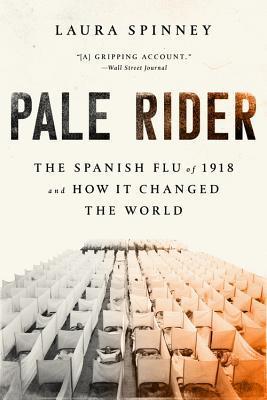
[*] Download PDF Here => Pale Rider: The Spanish Flu of 1918 and How It Changed the World
[*] Read PDF Here => Pale Rider: The Spanish Flu of 1918 and How It Changed the World
0 notes
Text
PDF Pale Rider: The Spanish Flu of 1918 and How It Changed the World -- Laura Spinney
Download Or Read PDF Pale Rider: The Spanish Flu of 1918 and How It Changed the World - Laura Spinney Free Full Pages Online With Audiobook.
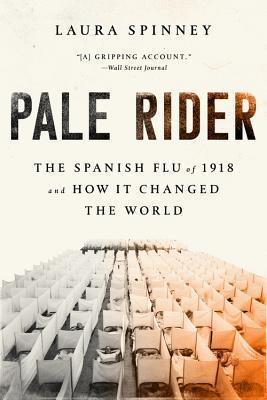
[*] Download PDF Here => Pale Rider: The Spanish Flu of 1918 and How It Changed the World
[*] Read PDF Here => Pale Rider: The Spanish Flu of 1918 and How It Changed the World
0 notes
Text
Download Pale Rider: The Spanish Flu of 1918 and How It Changed the World EBOOK BY Laura Spinney
Pale Rider: The Spanish Flu of 1918 and How It Changed the World - Laura Spinney
READ & DOWNLOAD Laura Spinney book Pale Rider: The Spanish Flu of 1918 and How It Changed the World in PDF, EPub, Mobi, Kindle online. Free book, AudioBook, Reender Book Pale Rider: The Spanish Flu of 1918 and How It Changed the World by Laura Spinney full book,full ebook full Download.
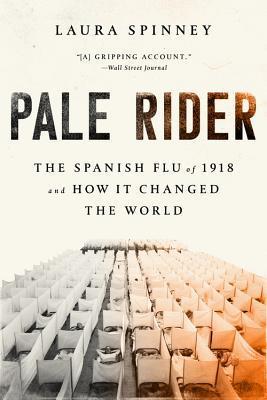
Read / Download Pale Rider: The Spanish Flu of 1918 and How It Changed the World
DESCRIPTION BOOK : In 1918, the Italian-Americans of New York, the Yupik of Alaska and the Persians of Mashed had almost nothing in common except for a virus--one that triggered the worst pandemic of modern times and had a decisive effect on the history of the twentieth century.The Spanish flu of 1918-1920 was one of the greatest human disasters of all time. It infected a third of the people on Earth--from the poorest immigrants of New York City to the king of Spain, Franz Kafka, Mahatma Gandhi and Woodrow Wilson. But despite a death toll of between 50 and 100 million people, it exists in our memory as an afterthought to World War I.In this gripping narrative history, Laura Spinney traces the overlooked pandemic to reveal how the virus travelled across the globe, exposing mankind's vulnerability and putting our ingenuity to the test. As socially significant as both world wars, the Spanish flu dramatically disrupted--and often permanently altered--global politics, race relations and family structures,
DETAIL BOOK :
Author : Laura Spinney
Pages : 352 pages
Publisher : PublicAffairs
Language :
ISBN-10 : 1541736125
ISBN-13 : 9781541736122
Supporting format: PDF, EPUB, Kindle, Audio, MOBI, HTML, RTF, TXT, etc.
Supporting : PC, Android, Apple, Ipad, Iphone, etc.
================*================
Tag the PDF
- Pale Rider: The Spanish Flu of 1918 and How It Changed the World by Laura Spinney Ebook PDF
- Pale Rider: The Spanish Flu of 1918 and How It Changed the World by Laura Spinney PDF Download
- Pale Rider: The Spanish Flu of 1918 and How It Changed the World by Laura Spinney EPUB
- Pale Rider: The Spanish Flu of 1918 and How It Changed the World by Laura Spinney EBOOK
- Pale Rider: The Spanish Flu of 1918 and How It Changed the World by Laura Spinney PDF Online
- Pale Rider: The Spanish Flu of 1918 and How It Changed the World by Laura Spinney E-BOOK Online
- Pale Rider: The Spanish Flu of 1918 and How It Changed the World by Laura Spinney PDF Free
- Pale Rider: The Spanish Flu of 1918 and How It Changed the World by Laura Spinney ebook library
- Pale Rider: The Spanish Flu of 1918 and How It Changed the World by Laura Spinney pdf document
- Pale Rider: The Spanish Flu of 1918 and How It Changed the World by Laura Spinney pdf reader
- Pale Rider: The Spanish Flu of 1918 and How It Changed the World by Laura Spinney ebook creator
- Pale Rider: The Spanish Flu of 1918 and How It Changed the World by Laura Spinney ebook deals
- Pale Rider: The Spanish Flu of 1918 and How It Changed the World by Laura Spinney ebook kindle
- Ebook PDF Pale Rider: The Spanish Flu of 1918 and How It Changed the World by Laura Spinney
- PDF Download Pale Rider: The Spanish Flu of 1918 and How It Changed the World by Laura Spinney
- EPUB Pale Rider: The Spanish Flu of 1918 and How It Changed the World by Laura Spinney
- EBOOK Pale Rider: The Spanish Flu of 1918 and How It Changed the World by Laura Spinney
- PDF Online Pale Rider: The Spanish Flu of 1918 and How It Changed the World by Laura Spinney
- E-BOOK Online Pale Rider: The Spanish Flu of 1918 and How It Changed the World by Laura Spinney
- PDF Free Pale Rider: The Spanish Flu of 1918 and How It Changed the World by Laura Spinney
- ebook library Pale Rider: The Spanish Flu of 1918 and How It Changed the World by Laura Spinney
- pdf document Pale Rider: The Spanish Flu of 1918 and How It Changed the World by Laura Spinney
- pdf reader Pale Rider: The Spanish Flu of 1918 and How It Changed the World by Laura Spinney
- ebook creator Pale Rider: The Spanish Flu of 1918 and How It Changed the World by Laura Spinney
- ebook deals Pale Rider: The Spanish Flu of 1918 and How It Changed the World by Laura Spinney
- ebook kindle Pale Rider: The Spanish Flu of 1918 and How It Changed the World by Laura Spinney
0 notes
Text
Nihayet satışta 😎🤓
0 notes
Photo
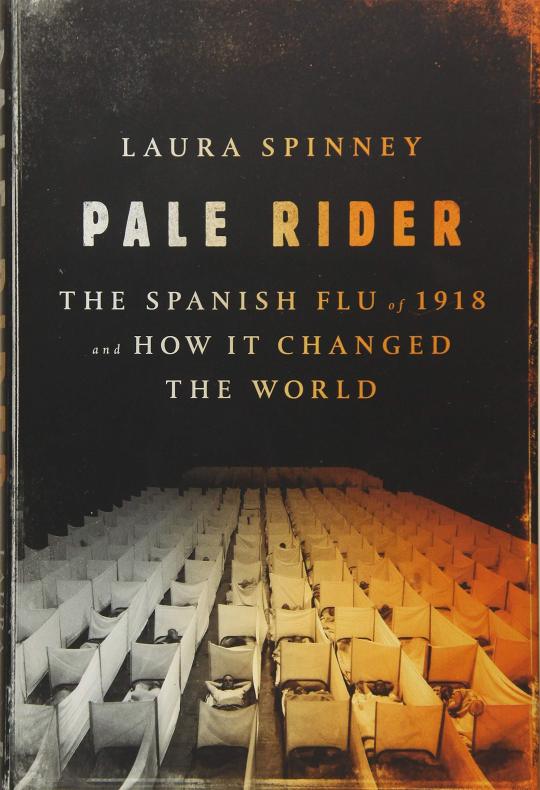
Let's get this out out of the way: This title slaps. I've wanted to read this book since it came out a few years ago based on the title alone. I finally got the audiobook, and...
It's pretty good. Not revelatory, but I enjoyed it. It's well-written, has up-to-date information on what we now know about the genetics of the 1918 flu, and covers a lot of the world that's typically left out of other books on the topic. For instance, Spinney discusses how the flu progressed inSouth Africa, India, China, Australia, and Brazil (among other places). It's fascinating to see how different societies coped--or didn't cope--with the pandemic.
One point of interest: There's still debate about where the 1918 flu originated. Kansas remains the most likely candidate, but there are other scientists and historians who present evidence for either a European and Chinese birthplace. Because of the primitive science of the time and the lack of samples that remain, we may never know for sure.
I definitely recommend this book for anyone who's interested in the subject and wants an up-to-date read, since so many of the other books on the topic came out in the 90s or early aughts.
#book review#book#history#historical nonfiction#nonfiction#1918 pandemic#spanish flu#pale rider#laura spinney#pandemic#medical history
28 notes
·
View notes
Text
Three books to help you understand right now
Three books to help you understand right now
I promised this year some book recommendations as part of my little blogging experiment, but I’m going to apologize in advance: a lot of what I read (and, in some cases, listen to) aren’t exactly cheerful, but they definitely end up being incredibly informative on a lot of levels. I’ve decided to start with the three books below because in many, many ways they help to frame the situation that we…
View On WordPress
#1918 flu#book recommendations#Daniel Ziblatt#democracy#History#history of medicine#John Barry#Laura Spinney#political science#Steven Levitsky
1 note
·
View note
Text
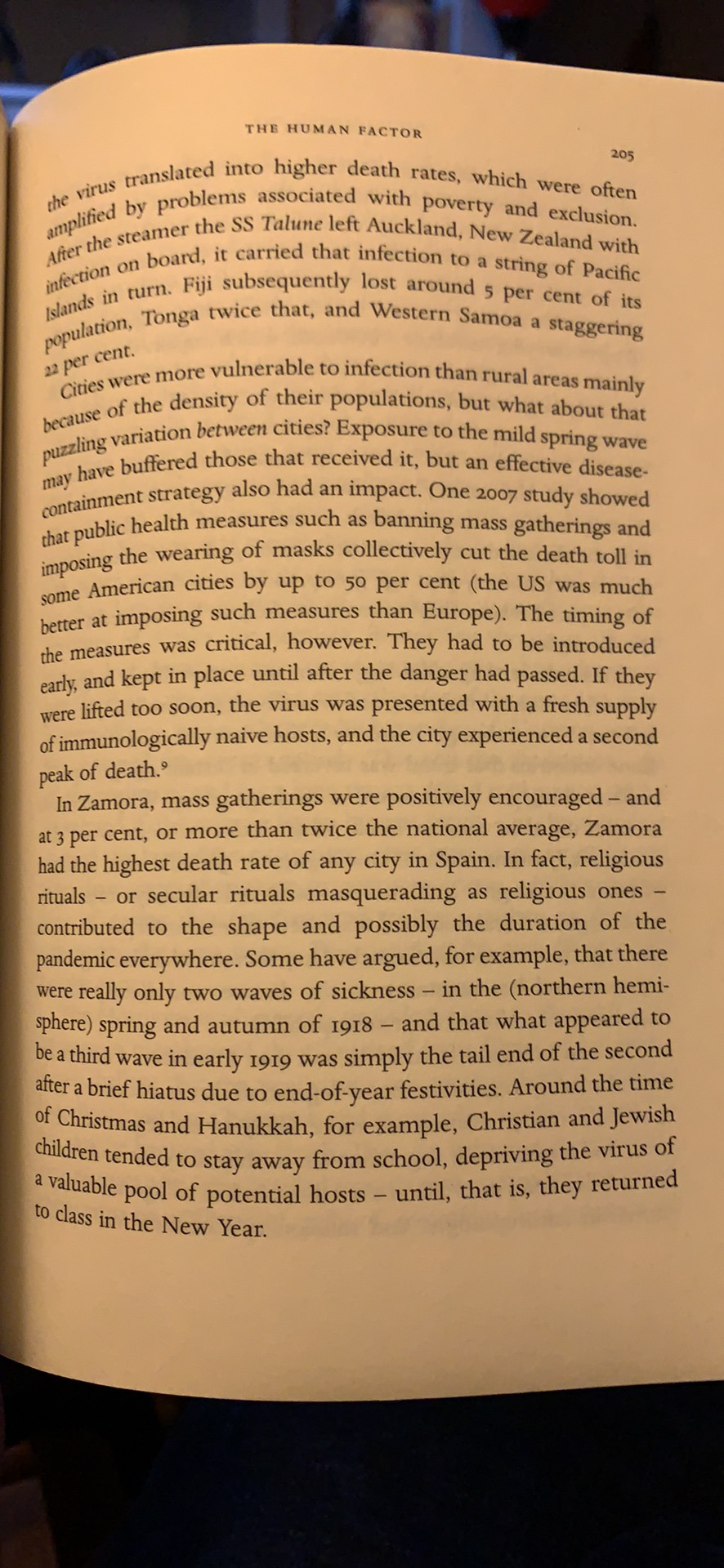
“Pale Rider: The Spanish Flu of 1918 and How it Changed the World” by Laura Spinney
1 note
·
View note
Quote
Sabloff forces us to ask what we mean by political agency. In most cases, for example, the women had no say in whom they married. They were used as bargaining chips by their male relatives in an eternally shifting landscape of political alliances. They answered to their husbands and were usually excluded from war- and policymaking. But they found other ways to exert influence, some of which were not available to men.
They gave birth to future heirs, of course, and in many of the societies succession was bilateral – meaning that it could pass via the maternal or paternal lines. ‘These women had blood power,’ says Sabloff. They spied for their kin, with whom their loyalty often remained. One Aztec princess burned her husband’s town so that her father could conquer it more easily. They were singers and storytellers at court, and they used these arts to influence behaviour – think Scheherazade in One Thousand and One Nights. And it was not uncommon for them to monopolise access to the gods. Main wives consulted oracles on behalf of their husbands, or conveyed prophecies or dreams. ‘Concerning the report on the military campaign which my lord undertakes,’ wrote Zimri-Lim’s main wife Shibtu to her husband, while he was away fighting a rival, ‘I have asked a man and a woman about the signs when I plied [them with drink], and the oracle for my lord is very favourable.’
Royal women often succeeded in building political agency even though they were pawns, Sabloff concludes, and their societies allowed them to. The roles they filled and the powers they wielded overlapped with those of their male counterparts, but they weren’t the same, and the women put them at the service of different – sometimes competing – constituencies. Marcus, Gero and others were therefore right when they said that societal change – history – could not be understood if they were ignored.
Laura Spinney, What big history says about how royal women exercise power
8 notes
·
View notes